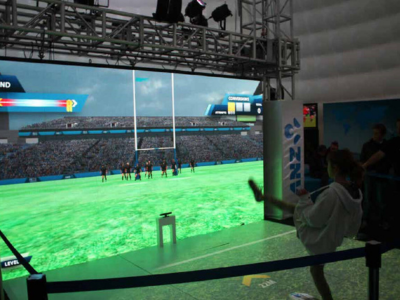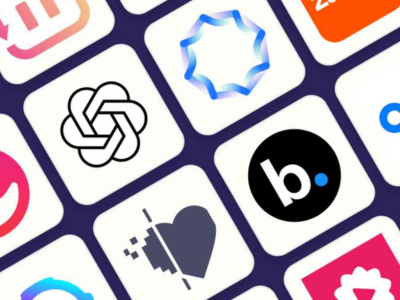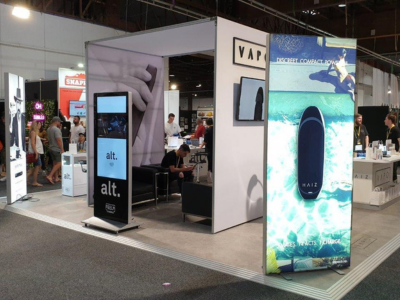Navigating the future: Trade Show Industry Through AI Innovation
Explore the future of trade shows with our essential blog. Learn how artificial intelligence is changing the trade show world. It's a must-read for anyone in the industry.
See how AI is making event planning better, boosting engagement, and changing the attendee experience.
Check out our interactive displays and see how they're changing the game for our clients' businesses.
The trade show industry is key for business networking, product launches, and collaboration. Artificial Intelligence (AI) is changing how trade shows work and add value. It's making events more effective and engaging.

Why AI matters for trade show and exhibition strategies
AI is a game-changer for trade show strategies. It affects key areas that impact event success and relevance. AI is changing how we organize, experience, and use these events in valuable ways.
AI makes trade shows more accessible by offering virtual experiences. People worldwide can now engage with exhibits and presentations remotely. This breaks down barriers and opens up new collaboration opportunities.
How Is AI changing the landscape of the trade show industry?
AI is making trade show experiences memorable and engaging. It's enhancing user experiences in several ways:
Personalised Experiences:
AI uses algorithms to create personalized experiences. It tailors schedules and content recommendations to match attendees' interests. This makes events more personal and engaging.
Operational Efficiency:
AI streamlines event operations. It improves logistics, resource allocation, and scheduling. AI helps organizers make informed decisions for a smooth event flow.
Global Accessibility:
AI offers virtual experiences that reach beyond geographical limits. Attendees worldwide can engage with exhibits and presentations remotely. This expands participation and knowledge exchange.
Data-Driven Insights:
AI analytics provide deep insights into attendee behavior. Organizers can adapt strategies in real-time. This ensures better event planning and ROI for exhibitors.
The importance of AI on Trade Show Planning

Improved Personalisation and Engagement
AI makes trade show planning more effective. It delivers personalized and engaging experiences for attendees. AI analyzes data to understand audience preferences and behaviors.
AI chatbots and virtual assistants enhance personalization. They provide real-time assistance and recommendations. This creates a more meaningful experience for attendees, building stronger connections with exhibitors.

More Immersive Booth Experience
AI technologies like augmented reality (AR) and virtual reality (VR) transform booths. Exhibitors showcase products in virtual environments. This creates memorable experiences and helps businesses stand out.

Lead Follow-Ups Made Easier
Managing leads from trade shows used to take a lot of time. But AI has made it easier. AI sorts and prioritizes leads based on how interested they are and how likely they are to buy. This lets businesses focus on the best leads, making their sales and marketing teams more efficient.

Creating Marketing Material
AI is key in making marketing materials for trade shows. It uses natural language processing to create engaging content for ads, presentations, and social media. This saves time and makes sure the content speaks to the audience.

Smarter Exhibition Management
AI helps a lot with planning and running trade shows. It uses predictive analytics to guess how many people will come. This helps organizers plan better, like knowing when to expect crowds and where to put booths.
AI technologies to make your tradeshow and exhibition stand immersive.
Touch Technology for Interactive Engagement:
Touchscreens and interactive displays let people engage with content. They can look through product catalogs and even customize their experience. AI makes touch technology better, making interactions smooth and engaging.
Virtual Walls for Dynamic Visuals:
Virtual walls are the digital face of exhibition stands. AI turns them into changing displays. They can show interactive content and change based on what people do. This grabs the audience's attention and lets exhibitors show off their products in a striking way.
Augmented Reality (AR) for Enhanced Realism:
Augmented Reality blends digital and real worlds. AI makes AR experiences more realistic. People can see products in real life. This adds sophistication to exhibition stands, making them more interesting and informative.
Digital Displays
Digital displays like digital signage are key in modern stands. AI changes what they show based on who's looking. This keeps the exhibition stand interesting and relevant, adapting to what people want.
Virtual Reality (VR) for Immersive Experiences
Virtual Reality takes people to new worlds. AI makes VR more personal by changing content based on what users do. VR stands can show products in 3D and even simulate real-world scenarios, offering a deep, immersive experience.
